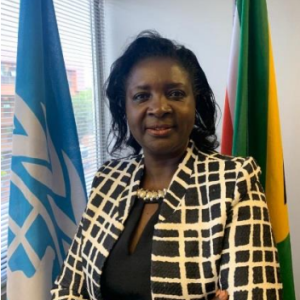Anti-Corruption Day statement by Ms. Jane Marie Ongolo Regional Representative, UNODC Southern Africa
Corruption erodes trust, weakens democracy, hampers economic development, exacerbates inequality, poverty, social division and the environmental crisis.
Master of Ceremony, Dr Moeletsi Leballo
Acting Minister for Public Service and Administration, Honorable Thulas Nxesi,
Vice-Chancellor of the University of South Africa, Professor Puleng Lenkabula
Chairperson of the Public Service Commission, Professor Somadoda Fikeni
Deputy Commissioner of the Public Service Commission, Ms Zukiswa Mqolomba
Commissioners of the Public Service Commission,
Heads of constitutional bodies and law enforcement agencies,
Members of the diplomatic corps,
Representatives of civil society organizations and private sector,
Members of the academia, fellow speakers and panelists,
Fellow Colleagues,
Distinguished Ladies and Gentlemen.
9 December marks the International Anti-Corruption Day as was designated by the UN General Assembly in 2003. We are gathered here today to commemorate this important day. By observing the International Anti-Corruption Day, the Government of South Africa joins many other nations of the world in re-affirming its commitment to preventing and countering corruption through the effective implementation of the United Nations Convention against Corruption, or UNCAC as we often call it. The Convention, with its 189 States parties, is nearing universal ratification. My Office, UNODC, is honored to be the guardian of this Convention, and the secretariat to its Conference of the States parties. South Africa ratified this Convention it its early days, in 2005, taking a massive commitment to tackle the scourge of corruption.
The theme for this year’s celebration is UNCAC at 20: Uniting the World against Corruption! This theme is building a momentum for the year 2023, when the Convention will be 20 years in existence. It also highlights the crucial link between anti-corruption and peace, security, and development. In 2019, the then Executive Director of UNODC, Mr. Yury Fedotov, in his statement for International Anti-Corruption Day highlighted that “corruption thwarts our attempts at building a better world”. This is the key reason for all nations, and all of us, to unite against corruption, on the International Anti-Corruption Day, and beyond as we mark 20 years of UNCAC.
The world will never be better if societies continue to tolerate corruption. Corruption erodes trust, weakens democracy, hampers economic development, and further exacerbates inequality, poverty, social division, and the environmental crisis. Corruption holds back progress on developmental goals and programmes. Tackling corruption is therefore necessary for creating a conducive environment for the achievement of the Sustainable Development Goals, thereby building a better life for the future generation.
The United Nations Convention against Corruption is the sole legally binding universal anti-corruption instrument. The Convention's far-reaching approach and the mandatory character of many of its provisions make it a unique tool for developing a comprehensive response to this global scourge.
South Africa took part in the negotiation of the Convention in 2003, and even before its official ratification, had already commenced with major anti-corruption reforms. Various laws, such as the Protected Disclosures Act and the Promotion of Access to Information Act, which are critical in the fight against corruption, were enacted. Legislative reforms culminated in the enactment of the Prevention and Combating of Corrupt Activities Act in 2004. Institutional reforms were also undertaken between 1996 and 2007, with the establishment of various constitutional bodies and some of the law enforcement agencies that are in attendance here today. By 2007, South Africa had put in place a robust framework to address corruption.
UNODC supports South Africa’s ideals of building an effective government, which has the capacity to put in place the necessary infrastructure to provide essential services to its citizens. We believe in the Government’s National Development Plan Vision 2030, which seeks to build a society that has zero tolerance for corruption and where anti-corruption agencies have the resources, independence and powers to tackle corruption effectively. Anti-corruption agencies and oversight bodies are essential for the fight against corruption. They need the support of the Government and all sectors of society. We call on governments around the world to take concrete steps to protect these institutions.
I also call upon us all to unite in building accountable and transparent institutions that enable people everywhere to access opportunities and live healthy and productive lives. United, we can create an environment where the rule of law prevails. Each of us can contribute by refusing to participate in any activities that are not legal and transparent, and by reporting to relevant bodies any incidents of corruption.
Building partnerships and enhancing cooperation with the private sector, civil society, academia, and the general public is also fundamental for the fight against corruption. We should galvanize our youth and educate and empower them on the value of living ethically. We should also consider gender-dimensions of corruption and ensure that the voices of women are loud and bold – and heard. These relevant stakeholders are key for the exchange of knowledge, data and best practices to enable comprehensive discussions and actions for the advancement of the implementation of the Convention and the Sustainable Development Goals.
In conclusion, 20 years of the Convention is a good moment to reflect on the achievements made and most importantly, to identify and determine specific areas of the anti-corruption frameworks that can be bolstered and intensified. South Africa can continue to count on the support of the United Nations in the broader areas of anti-corruption, governance, transparency and accountability.
I thank you!
Speech by




